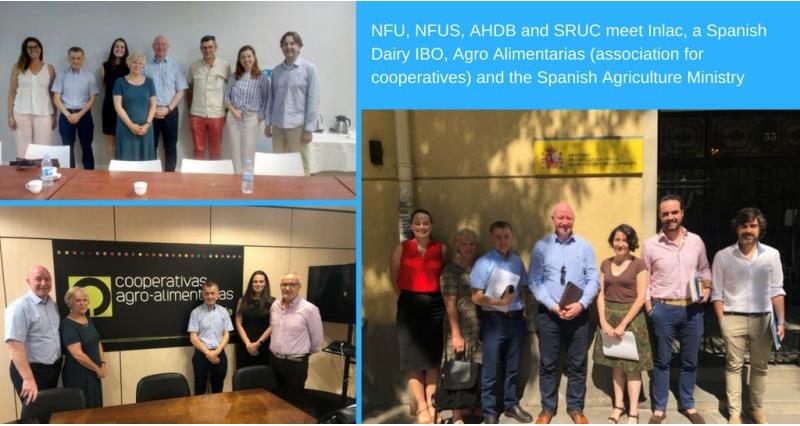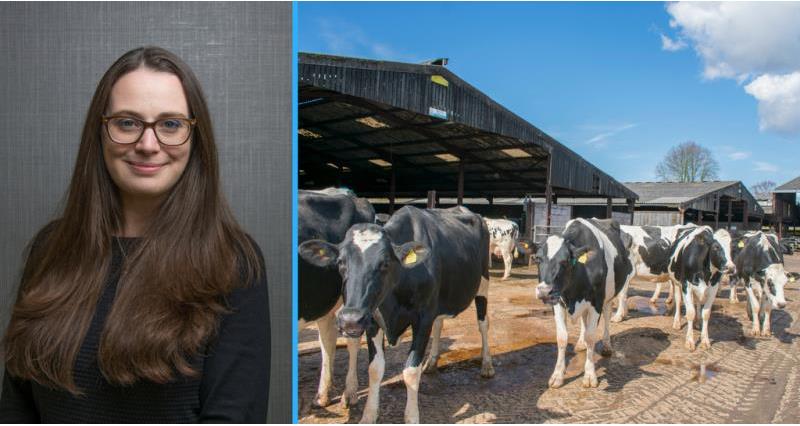In July I visited Madrid with colleagues from AHDB, NFU Scotland (NFUS) and Scotland’s Rural College (SRUC) to find out about the regulation of dairy contracts in Spain - the Spanish government has made use of the 2012 EU Dairy Package measures and has brought in mandatory contract terms. There were some really useful points for us in the UK to learn from; but first, let’s have a quick look at the Spanish dairy market:
- Spanish milk production is growing - from 6 million tonnes in 2012 to 7 million tonnes today.
- There are around 14,500 Spanish dairy farmers, supplying between 330-544 first buyers (not all first buyers are processors). Of the first buyers, around 98 are cooperatives.
- Cow’s milk accounts for 89% of milk production – the rest is sheep and goat milk.
- 40% of all milk production goes into liquid milk (this is all UHT – there is almost no fresh milk sold in Spain).
- In 2018 the Spanish milk price average is 5% lower than the EU average (the UK’s is 6.4% lower than the EU average) but since April 2017 it has increased by 2% whereas the EU average has dropped 2%.
What does regulation in Spain look like?
All milk sold by farmers to first buyers is now sold on regulated contracts. The contracts are fixed term, for a minimum 12 month period. Prices are fixed or variable or mixed. Fixed prices are set out in the contract for the whole contract duration. Variable prices start with an agreed base price that then moves each month with an index. Mixed prices combine the two.
So for example, a contract could pay 30ppl for the first 6 months and then 32 ppl for the next 6 months. Or a contract could pay 30ppl as a base price to be increased or decreased each month in line with the increases or decreases of the Spanish butter price.
The volume of milk to be supplied is also fixed in the contract, +/- 10%.
Once a contract has been fixed, it cannot be changed, even if both parties want to change it. At the end of the term, the parties can agree a new contract, or part company.
The regulation in Spain also covers POs and it created an IBO (an inter-branch organisation) called Inlac. Inlac’s membership is dairy processors and farming organisations, and it registers the contracts, publishes data and information, promotes dairy products and can mediate disputes between farmers and processors.

How has it worked?
Milk processors in Spain were worried about the regulation of contracts. They were especially concerned about fixing prices for at least 12 months and how they would then negotiate with retailers. When the regulation first came in, the industry had to adapt and it was challenging; farmers had to adapt to fixed volumes and processors had to adapt to inflexible pricing. But overall both farmers and processors are pleased with how the regulation has worked.
The regulation has delivered stability, clarity, transparency and certainty. It has improved relationships between farmers and processors.
But it is very inflexible – the parties cannot change the terms of the contract, even if they want to.
In addition, it has not delivered a higher milk price and it has not increased the bargaining power of farmers. In Spain they are looking to POs to help improve farmers’ negotiating position and a consultation is running at the moment for a new law to strengthen the position of POs.
So what can we learn from the Spanish?
There are a few key points for us to take away:
- Although regulating dairy contracts means a period of adjustment for the industry, it can be of overall benefit to farmers and processors.
- Processors can adapt to long term stable pricing, and farmers can adapt to fixed volumes.
- A very rigid and inflexible contract doesn’t help farmers or processors; it would be better to allow farmers and processors to change the contract terms if they both want to do so.
- A fairer contract can deliver transparency, certainty and stability, and it can improve relationships between farmers and processors.
- A regulated contract will not of itself deliver a higher milk price or improve farmers’ negotiating power.
- It is entirely possible for EU Member States to use the EU Dairy Package flexibly, bringing in provisions to suit their home market and industry. The EU Dairy Package is not an exhaustive and limited list of how a contract can be regulated.
What’s next?
We’re continuing to look at how other EU Member States have regulated dairy contracts, so that we can learn from what others have done, in anticipation of a consultation expected from Defra in the coming months on regulating dairy contracts here in the UK.
A word from Spain…
Agueda García-Agulló Bustillo, Directora Gerente of Inlac said “The point of view from the farmers and the processors is not the same in many aspects of the regulation in the Spanish Dairy sector, but they all agree that the regulation is good. Despite that, in some aspects more flexibility is welcomed.”
“The standard contracts make relations between farmers and processors more transparent, certain and stable. There is still work to be done on the negotiating position between farmers-processors and processors-retail.”
“Inlac has learned a lot about the sector through the mechanism of dispute resolution, we found out where regulation does not work well.”
